
Lecture Series, Policy Studies Forum / Cultural Interaction in East Asia, Cultural Studies Open Seminar / Cultural Change, Chuo University Graduate School of Policy Studies, Autumn ~ Winter 2004
Policy Studies Forum / Cultural Interaction in East Asia, Tuesdays 6:10 ~, Sept. 28 ~ Jan. 11, Chuo University Korakuen Campus, building 3, floor 11, room 31112
Oct. 5 |
Akira Iriye, Harvard University, Cultural Globalization in East Asia |
Oct. 19 |
Akitoshi Miyashita, Tokyo International University, Reactive State Revisited: Japan Between America and Asia (4:35 ~ ) |
Nov. 9 |
Yuzo Itagaki, University of Tokyo (Emeritus), Identity Choosing in Cultural Dynamics for Japan: A Perceptional Approach in Historical Perspective |
Nov. 16 |
John Clammer, Sophia University, Cultural Change in East Asia: A Comparative Perspective |
Dec. 14 |
David Walker, Deakin University, Australia in Asia: Race, Region, Identity |
Cultural Studies Open Seminar / Cultural Change, Saturdays 6:30 ~, Sept. 25 ~ Jan. 8, Chuo University Korakuen Campus, building 3, floor 11, room 31100
Oct. 16 |
David Ewick, Chuo University, Edward Said and the Politics of Cyberspace |
Nov. 6 |
Hiroshi Yoshioka, Institute of Advanced Media Arts & Sciences, How to Do Things with Art |
Nov. 13 |
Modjtaba Sadria, Chuo University, Subaltern Culture and Social Change |
Nov. 20 |
Tin Tin Htun, Chuo University, Cultural Mandate and Motherhood in Japan |
Nov. 27 |
Sujaya Dhanvantari, Chuo University, The Debt of Colonial History: Frantz Fanon |
Dec. 4 |
Anne Waldman, Naropa University, Changing the Frequency: New Modal Structures—Poetry and Politics in Performance |
Dec. 11 |
Chizuko Ueno, University of Tokyo, Book Talk on Nationalism and Gender |
Book links, to the Amazon sites, will open in a new window. A note on getting to the Korakuen Campus may be found here.
A powerful voice for internationalism, Akira Iriye should be required reading for the twenty-first century.
Emily S. Rosenberg, DeWitt Wallace Professor of History, Macalester College
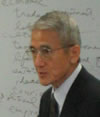 Akira
Iriye after graduating from Seikei High School in Tokyo earned
his PhD in U.S. and East Asian History at Harvard University. From 1984
to 1989 he was Stein-Freiler Distinguished Service Professor of History
at the University of Chicago, and since 1991 he has been Charles Warren
Professor of American History at Harvard University, where he is currently
Chair of the Department of History. He has been Professor of American
Civilization at the Ecoles des Hautes Etudes en Sciences Sociales, Paris,
Burns Distinguished
Professor at the University of Hawaii, Centennial Visiting Professor at
the London School of Economics, and Director of the Edwin O. Reischauer
Institute of Japanese Studies at Harvard University. His many books include
After
Imperialism: The Search for a New Order in the Far East, 1921-1931
(Harvard University Press, 1965), Across
the Pacific: An Inner History of American-East-Asian Relations
(Harcourt, Brace, 1967), Pacific
Estrangement: American and Japanese Expansion, 1897-1911 (Harvard
University Press, 1972), The
Cold War in Asia (Prentice-Hall, 1974), From
Nationalism to Internationalism: American Foreign Policy to 1914
(Routledge and Kegan Paul, 1977), Power
and Culture: The Japanese-American War, 1941-1945 (Harvard University
Press, 1981), The
Origins of the Second World War in Asia and the Pacific (Longman,
1987), China
and Japan in the Global Setting (Harvard University Press, 1992),
The
Globalizing of America: United States Foreign Relations, 1913-1945
(Cambridge University Press, 1993), Cultural
Internationalism and World Order (Johns Hopkins University Press,
1997), Japan
and the Wider World (Longman, 1997), Pearl
Harbor and the Coming of the Pacific War (Bedford, 1999), and
Global
Community: The Role of International Organizations in the Making of the
Contemporary World (University of California Press, 2002). To
download a guide to finding Professor Iriye’s English- and Japanese-language
books in libraries in Japan click here.
Akira
Iriye after graduating from Seikei High School in Tokyo earned
his PhD in U.S. and East Asian History at Harvard University. From 1984
to 1989 he was Stein-Freiler Distinguished Service Professor of History
at the University of Chicago, and since 1991 he has been Charles Warren
Professor of American History at Harvard University, where he is currently
Chair of the Department of History. He has been Professor of American
Civilization at the Ecoles des Hautes Etudes en Sciences Sociales, Paris,
Burns Distinguished
Professor at the University of Hawaii, Centennial Visiting Professor at
the London School of Economics, and Director of the Edwin O. Reischauer
Institute of Japanese Studies at Harvard University. His many books include
After
Imperialism: The Search for a New Order in the Far East, 1921-1931
(Harvard University Press, 1965), Across
the Pacific: An Inner History of American-East-Asian Relations
(Harcourt, Brace, 1967), Pacific
Estrangement: American and Japanese Expansion, 1897-1911 (Harvard
University Press, 1972), The
Cold War in Asia (Prentice-Hall, 1974), From
Nationalism to Internationalism: American Foreign Policy to 1914
(Routledge and Kegan Paul, 1977), Power
and Culture: The Japanese-American War, 1941-1945 (Harvard University
Press, 1981), The
Origins of the Second World War in Asia and the Pacific (Longman,
1987), China
and Japan in the Global Setting (Harvard University Press, 1992),
The
Globalizing of America: United States Foreign Relations, 1913-1945
(Cambridge University Press, 1993), Cultural
Internationalism and World Order (Johns Hopkins University Press,
1997), Japan
and the Wider World (Longman, 1997), Pearl
Harbor and the Coming of the Pacific War (Bedford, 1999), and
Global
Community: The Role of International Organizations in the Making of the
Contemporary World (University of California Press, 2002). To
download a guide to finding Professor Iriye’s English- and Japanese-language
books in libraries in Japan click here.
Akira Iriye, Cultural Globalization in East Asia, Policy Studies Forum, Tuesday October 5, 6:10 ~
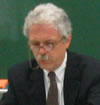 David
Ewick is Professor of Comparative Culture at the Faculty of Policy
Studies, Chuo University, and co-organizer of this lecture series. “Edward
Said and the Politics of Cyberspace” was first presented at Jadavpur
University, Kolkata, as part of the symposium Other Voices, Other Cultures:
Rereading Orientalism, August 12 ~ 14, 2004.
David
Ewick is Professor of Comparative Culture at the Faculty of Policy
Studies, Chuo University, and co-organizer of this lecture series. “Edward
Said and the Politics of Cyberspace” was first presented at Jadavpur
University, Kolkata, as part of the symposium Other Voices, Other Cultures:
Rereading Orientalism, August 12 ~ 14, 2004.
David Ewick, Edward Said and the Politics of Cyberspace, Cultural Studies Open Seminar, Saturday October 16, 6:30 ~
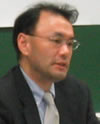 Akitoshi
Miyashita earned his PhD in International Relations at Columbia
University in 1997 and is now Associate Professor of International Relations
at Tokyo International University. He is the author of Limits
to Power: Asymmetric Dependence and Japanese Foreign Aid Policy (Lexington
Books, 2003) and editor of Japanese
Foreign Policy in Asia and the Pacific: Domestic Interests, American Pressure,
and Regional Integration
(with Yoichiro Sato, Palgrave, 2001). To download a guide to finding Professor
Miyashita’s work in libraries in Japan click here.
Akitoshi
Miyashita earned his PhD in International Relations at Columbia
University in 1997 and is now Associate Professor of International Relations
at Tokyo International University. He is the author of Limits
to Power: Asymmetric Dependence and Japanese Foreign Aid Policy (Lexington
Books, 2003) and editor of Japanese
Foreign Policy in Asia and the Pacific: Domestic Interests, American Pressure,
and Regional Integration
(with Yoichiro Sato, Palgrave, 2001). To download a guide to finding Professor
Miyashita’s work in libraries in Japan click here.
Akitoshi Miyashita, Reactive State Revisited: Japan Between America and Asia, Policy Studies Forum, Tuesday October 19, 4:35 ~
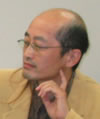 Hiroshi
Yoshioka is Professor of Philosophy and Media Aesthetics at the
Institute of Advanced Media Arts and Sciences (IAMAS) in Ogaki, editor
of Diatxt.—the
critical quarterly of the Kyoto Art Center—and head of the editorial
board of the Japanese Association of Semiotic Studies. He maintains an
online presence at Space
in Cyberspace, which includes electronic versions of some of his essays
in English and Japanese, including Actuality
of Waiting—Approaching ‘Slowness’ (originally in
Diatxt. 8, February 2003), The
Invisible Male Body (originally in Filozofski vestik 23,
February 2002), and Samurai
and Self-Colonization in Japan, which has been a staple in Professor
Ewick’s undergraduate comparative culture seminars since it appeared
in The
Decolonization of Imagination: Culture, Knowledge, and Power
(Zed Books, 1995). He is the author of “Shisô”
no genzaikei: Fukuzatsukei, dennôkûkan, afôdansu
(The Present Tense of Thought: Complex Systems, Cyberspace, and Affordance
Theory, Kôdansha, 1997) and Jôhô
to seimei: Nô, kompyûta, uchû (Information
and Life: The Brain, Computers, and the Universe, with Hisashi Muroi,
Shin’yôsha, 1993). He has also published translations of works
such as Mark Poster’s The Mode of Information: Poststructuralism
and Context, Bruce Mazlish’s The Fourth Discontinuity:
The Co-Evolution of Humans and Machines, and Hal Foster’s The
Anti-Aesthetic: Essays on Postmodern Culture. He was the general
director of the Kyoto Art Center Kyoto
Biennale 2003, which featured artists from Brazil, Slovenia, Croatia,
France, Germany, the United States, and Japan. To download a guide to
finding Professor Yoshioka’s work in libraries in Japan click here.
Hiroshi
Yoshioka is Professor of Philosophy and Media Aesthetics at the
Institute of Advanced Media Arts and Sciences (IAMAS) in Ogaki, editor
of Diatxt.—the
critical quarterly of the Kyoto Art Center—and head of the editorial
board of the Japanese Association of Semiotic Studies. He maintains an
online presence at Space
in Cyberspace, which includes electronic versions of some of his essays
in English and Japanese, including Actuality
of Waiting—Approaching ‘Slowness’ (originally in
Diatxt. 8, February 2003), The
Invisible Male Body (originally in Filozofski vestik 23,
February 2002), and Samurai
and Self-Colonization in Japan, which has been a staple in Professor
Ewick’s undergraduate comparative culture seminars since it appeared
in The
Decolonization of Imagination: Culture, Knowledge, and Power
(Zed Books, 1995). He is the author of “Shisô”
no genzaikei: Fukuzatsukei, dennôkûkan, afôdansu
(The Present Tense of Thought: Complex Systems, Cyberspace, and Affordance
Theory, Kôdansha, 1997) and Jôhô
to seimei: Nô, kompyûta, uchû (Information
and Life: The Brain, Computers, and the Universe, with Hisashi Muroi,
Shin’yôsha, 1993). He has also published translations of works
such as Mark Poster’s The Mode of Information: Poststructuralism
and Context, Bruce Mazlish’s The Fourth Discontinuity:
The Co-Evolution of Humans and Machines, and Hal Foster’s The
Anti-Aesthetic: Essays on Postmodern Culture. He was the general
director of the Kyoto Art Center Kyoto
Biennale 2003, which featured artists from Brazil, Slovenia, Croatia,
France, Germany, the United States, and Japan. To download a guide to
finding Professor Yoshioka’s work in libraries in Japan click here.
Hiroshi Yoshioka, How to Do Things with Art, Cultural Studies Open Seminar, Saturday November 6, 6:30 ~
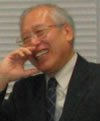 Yuzo
Itagaki after a distinguished career at the University of Tokyo
and Tokyo Keizai University is now Professor Emeritus at both. Among many
other works he is the author of Rekishi
no genzai to chiikigaku: Gendai chûtô eno shikaku
(Contemporary History and Area Studies: Viewing the Contemporary Middle
East, Iwanami shoten, 1992), Sekaishi
no kôzô (The Structure of World History, Asahi shimbunsha,
1993), Isurâmu
no toshisei (Characteristics of the City of Islam, with Akira
Gotô, Nihon gakujutsu shinkôkai, 1993), Isurâmu
gonin: Shôtotsu kara taiwa e (Islam Misunderstood: From
Conflict to Dialogue, Iwanami shoten, 2003), Mega
teikokushugi no shutsugen to Isrâmu gurôbaru genshô:
Iraku sensô go no sekai (The Rise of Mega-Imperialism and
the Globalization of Islam: The World After the Iraq War, with Mahdi Elmandjura,
Sekaishoin, 2004), and editor of Shin
Chûtô handobukku (New Handbook of the Middle East,
Kôdansha, 1992) and “Tai
tero sensô” to Isurâmu sekai (The “War
Against Terrorism” and the Islamic World, Iwanami shoten, 2002).
He is among the pioneers of Area Studies in Japan, and also among those
most responsible for introducing the work of Edward Said to the country,
in part through his work on the Japanese translation of Orientalism.
To download a guide to finding Professor Itagaki’s books in libraries
in Japan click here.
Yuzo
Itagaki after a distinguished career at the University of Tokyo
and Tokyo Keizai University is now Professor Emeritus at both. Among many
other works he is the author of Rekishi
no genzai to chiikigaku: Gendai chûtô eno shikaku
(Contemporary History and Area Studies: Viewing the Contemporary Middle
East, Iwanami shoten, 1992), Sekaishi
no kôzô (The Structure of World History, Asahi shimbunsha,
1993), Isurâmu
no toshisei (Characteristics of the City of Islam, with Akira
Gotô, Nihon gakujutsu shinkôkai, 1993), Isurâmu
gonin: Shôtotsu kara taiwa e (Islam Misunderstood: From
Conflict to Dialogue, Iwanami shoten, 2003), Mega
teikokushugi no shutsugen to Isrâmu gurôbaru genshô:
Iraku sensô go no sekai (The Rise of Mega-Imperialism and
the Globalization of Islam: The World After the Iraq War, with Mahdi Elmandjura,
Sekaishoin, 2004), and editor of Shin
Chûtô handobukku (New Handbook of the Middle East,
Kôdansha, 1992) and “Tai
tero sensô” to Isurâmu sekai (The “War
Against Terrorism” and the Islamic World, Iwanami shoten, 2002).
He is among the pioneers of Area Studies in Japan, and also among those
most responsible for introducing the work of Edward Said to the country,
in part through his work on the Japanese translation of Orientalism.
To download a guide to finding Professor Itagaki’s books in libraries
in Japan click here.
Yuzo Itagaki, Identity Choosing in Cultural Dynamics for Japan: A Perceptional Approach in Historical Perspective, Policy Studies Forum, Tuesday November 9, 6:10 ~
 Modjtaba
Sadria is Professor of Cross-Cultural and East-Asian Studies at
the Faculty of Policy Studies, Chuo University, and co-organizer of this
lecture series. He maintains an 0nline presence here.
Modjtaba
Sadria is Professor of Cross-Cultural and East-Asian Studies at
the Faculty of Policy Studies, Chuo University, and co-organizer of this
lecture series. He maintains an 0nline presence here.
Modjtaba Sadria, Subaltern Culture and Social Change, Cultural Studies Open Seminar, Saturday November 13, 6:30 ~
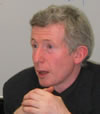 John
Clammer is Professor of Comparative Sociology and Asian Studies
at Sophia University in Tokyo, where he has taught since 1989. Prior to
this he held full-time appointments at the National University of Singapore
and the University of Hull. He has held visiting appointments at many
institutions, including the University of Oxford, the University of Kent,
the Australian National University, Murdoch University, the Institute
of Southeast Asian Studies in Singapore, the Bauhaus Universitat Weimer,
and the University of Buenos Aires. He has published extensively in the
fields of the sociology of culture, urban sociology, consumption, the
sociology of development, and Asian social theory. His recent books include
Contemporary
Urban Japan: A Sociology of Consumption (Blackwell, 1997), Race
and State in Independent Singapore: The Cultural Politics of Pluralism
in a Multiethnic Society (Ashgate, 1998), Japan
and Its Others: Globalization, Difference and the Critique of Modernity
(Trans Pacific, 2001), and Diaspora
and Identity: The Sociology of Culture in Southeast Asia
(Coronet, 2002). To download a guide to finding Professor Clammer’s
books in libraries in Japan click here.
John
Clammer is Professor of Comparative Sociology and Asian Studies
at Sophia University in Tokyo, where he has taught since 1989. Prior to
this he held full-time appointments at the National University of Singapore
and the University of Hull. He has held visiting appointments at many
institutions, including the University of Oxford, the University of Kent,
the Australian National University, Murdoch University, the Institute
of Southeast Asian Studies in Singapore, the Bauhaus Universitat Weimer,
and the University of Buenos Aires. He has published extensively in the
fields of the sociology of culture, urban sociology, consumption, the
sociology of development, and Asian social theory. His recent books include
Contemporary
Urban Japan: A Sociology of Consumption (Blackwell, 1997), Race
and State in Independent Singapore: The Cultural Politics of Pluralism
in a Multiethnic Society (Ashgate, 1998), Japan
and Its Others: Globalization, Difference and the Critique of Modernity
(Trans Pacific, 2001), and Diaspora
and Identity: The Sociology of Culture in Southeast Asia
(Coronet, 2002). To download a guide to finding Professor Clammer’s
books in libraries in Japan click here.
John Clammer, Cultural Policy and Cultural Change in East Asia: A Comparative Perspective, Policy Studies Forum, Tuesday November 16, 6:10 ~
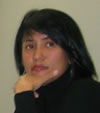 Tin
Tin Htun earned her PhD in Psychology at Tsukuba University. She
has taught at Chuo University, Temple University Japan, and Tsukuba University,
and has been a visiting researcher at Tsukuba University, Japan Women’s
University, and the Center for Research in Women’s Studies at the
University of British Columbia. She has published articles on women’s
leadership roles in Taijin
shinrigaku no shiten (Perspectives on Interpersonal Psychology,
edited by Y. Matsui, Brain shuppan, 2002) and in journals such as Tsukuba
Psychological Research and the Japanese Journal of Social Psychology.
Tin
Tin Htun earned her PhD in Psychology at Tsukuba University. She
has taught at Chuo University, Temple University Japan, and Tsukuba University,
and has been a visiting researcher at Tsukuba University, Japan Women’s
University, and the Center for Research in Women’s Studies at the
University of British Columbia. She has published articles on women’s
leadership roles in Taijin
shinrigaku no shiten (Perspectives on Interpersonal Psychology,
edited by Y. Matsui, Brain shuppan, 2002) and in journals such as Tsukuba
Psychological Research and the Japanese Journal of Social Psychology.
Tin Tin Htun, Cultural Mandate and Motherhood in Japan, Cultural Studies Open Seminar, Saturday November 20, 6:30 ~
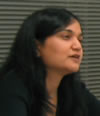 Sujaya
Dhanvantari is Lecturer at the Faculty of Policy Studies, Chuo
University. Her current and recently-completed work includes the PhD thesis
“A Return to the Present: Colonial Historiography in Frantz Fanon’s
Writing” and the essay “French Revolutionary Song in the Haitian
Revolution, 1798-1804,” in African
Diasporas in the New and Old Worlds: Consciousness and Imagination,
edited by Geneviève Fabre and Klaus Benesch (Rodopi, 2004).
Sujaya
Dhanvantari is Lecturer at the Faculty of Policy Studies, Chuo
University. Her current and recently-completed work includes the PhD thesis
“A Return to the Present: Colonial Historiography in Frantz Fanon’s
Writing” and the essay “French Revolutionary Song in the Haitian
Revolution, 1798-1804,” in African
Diasporas in the New and Old Worlds: Consciousness and Imagination,
edited by Geneviève Fabre and Klaus Benesch (Rodopi, 2004).
Sujaya Dhanvantari, The Debt of Colonial History: Frantz Fanon, Cultural Studies Open Seminar, Saturday November 27, 6:30 ~
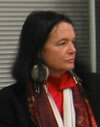 Anne
Waldman is a widely-acclaimed poet, performance artist, and activist,
and Distinguished Professor of Poetics at Naropa University in Boulder,
where in 1974, with Allen Ginsberg, she co-founded the Jack Kerouac School
of Disembodied Poetics. She is author or editor of more than forty books,
including Baby
Breakdown (Bobbs-Merrill, 1970), Life
Notes (Bobbs-Merrill, 1973), Fast
Speaking Woman and Other Chants (City Lights, 1975), Talking
Poetics from Naropa Institute (Shambhala, 1978), Makeup
on Empty Space (Toothpaste, 1984), Skin
Meat Bones (Coffee House, 1985), Helping
the Dreamer: New and Selected Poems 1966-1988 (Coffee House,
1989), Iovis
(Coffee House, 1993), Disembodied
Poetics: Annals of the Jack Kerouac School (University of New
Mexico Press, 1994), Kill
or Cure (Penguin, 1994), The
Beat Book (Shambhala, 1996), Iovis
Book II (Coffee House, 1997), Marriage:
A Sentence (Penguin, 2000), Vow
to Poetry: Essays, Interviews & Manifestoes (Coffee House,
2001), Dark
Arcana: Afterimage or Glow (accompanying photographs by Patti
Smith, Heaven Bone, 2003), In
the Room of Never Grieve: New and Selected Poems 1985-2003 (Coffee
House, 2003), Structure
of the World Compared to a Bubble (Penguin, 2004), and Civil
Disobediences: Poetics and Politics in Action (with Lisa Berman,
Coffee House, 2004).
Anne
Waldman is a widely-acclaimed poet, performance artist, and activist,
and Distinguished Professor of Poetics at Naropa University in Boulder,
where in 1974, with Allen Ginsberg, she co-founded the Jack Kerouac School
of Disembodied Poetics. She is author or editor of more than forty books,
including Baby
Breakdown (Bobbs-Merrill, 1970), Life
Notes (Bobbs-Merrill, 1973), Fast
Speaking Woman and Other Chants (City Lights, 1975), Talking
Poetics from Naropa Institute (Shambhala, 1978), Makeup
on Empty Space (Toothpaste, 1984), Skin
Meat Bones (Coffee House, 1985), Helping
the Dreamer: New and Selected Poems 1966-1988 (Coffee House,
1989), Iovis
(Coffee House, 1993), Disembodied
Poetics: Annals of the Jack Kerouac School (University of New
Mexico Press, 1994), Kill
or Cure (Penguin, 1994), The
Beat Book (Shambhala, 1996), Iovis
Book II (Coffee House, 1997), Marriage:
A Sentence (Penguin, 2000), Vow
to Poetry: Essays, Interviews & Manifestoes (Coffee House,
2001), Dark
Arcana: Afterimage or Glow (accompanying photographs by Patti
Smith, Heaven Bone, 2003), In
the Room of Never Grieve: New and Selected Poems 1985-2003 (Coffee
House, 2003), Structure
of the World Compared to a Bubble (Penguin, 2004), and Civil
Disobediences: Poetics and Politics in Action (with Lisa Berman,
Coffee House, 2004).
Anne Waldman, Changing the Frequency: New Modal Structures—Poetry and Politics in Performance, Cultural Studies Open Seminar, Saturday December 4, 6:30 ~
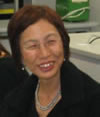 Chizuko
Ueno is Professor of Sociology and Gender Studies at the University
of Tokyo Graduate School of Humanities and Sociology. She has recently
given talks on her newly-translated Nationalism
and Gender (Trans Pacific, 2004) at Harvard University, Columbia
University, and Cornell University. In addition to Nationalism and
Gender and her many books in Japanese, her work in English includes
“The Position of Japanese Women Reconsidered,” Current
Anthropology 28.4, supplement (Aug.~Oct. 1987), “The Japanese
Women’s Movement: The Counter-Values to Industrialism,” in
The
Japanese Trajectory: Modernization and Beyond, edited by Gavan
McCormack and Yoshio Sugimoto (Cambridge University Press, 1988), “Women
and the Family in Transition in Postindustrial Japan,” in Women
of Japan and Korea: Continuity and Change, edited by Joyce Gelb
and Marian Lief Palley (Temple University Press, 1994), “Modern
Patriarchy and the Formation of the Japanese Nation State,” in Multicultural
Japan: Paleolithic to Postmodern, edited by Donald Denoon and
Gavan McCormack (Cambridge University Press, 1996), “The Declining
Birthrate: Whose Problem?” Review of Population and Social Policy
7 (1998, available as a .pdf download here),
“Gendering the Concept of ‘Labor,’” in Gender
and Japanese History, vol. 2, edited by Haruka Wakita, Anne Bouchey,
Chizuko Ueno, and others (Osaka University Press, 1999), and “The
Politics of Memory: Nation, Individual and Self,” History &
Memory 11.2 (Fall/Winter 1999). An English-language interview from
a number of years ago appears at nancho.net, here.
To download a guide to finding Professor Ueno’s books in libraries
in Japan click here.
Chizuko
Ueno is Professor of Sociology and Gender Studies at the University
of Tokyo Graduate School of Humanities and Sociology. She has recently
given talks on her newly-translated Nationalism
and Gender (Trans Pacific, 2004) at Harvard University, Columbia
University, and Cornell University. In addition to Nationalism and
Gender and her many books in Japanese, her work in English includes
“The Position of Japanese Women Reconsidered,” Current
Anthropology 28.4, supplement (Aug.~Oct. 1987), “The Japanese
Women’s Movement: The Counter-Values to Industrialism,” in
The
Japanese Trajectory: Modernization and Beyond, edited by Gavan
McCormack and Yoshio Sugimoto (Cambridge University Press, 1988), “Women
and the Family in Transition in Postindustrial Japan,” in Women
of Japan and Korea: Continuity and Change, edited by Joyce Gelb
and Marian Lief Palley (Temple University Press, 1994), “Modern
Patriarchy and the Formation of the Japanese Nation State,” in Multicultural
Japan: Paleolithic to Postmodern, edited by Donald Denoon and
Gavan McCormack (Cambridge University Press, 1996), “The Declining
Birthrate: Whose Problem?” Review of Population and Social Policy
7 (1998, available as a .pdf download here),
“Gendering the Concept of ‘Labor,’” in Gender
and Japanese History, vol. 2, edited by Haruka Wakita, Anne Bouchey,
Chizuko Ueno, and others (Osaka University Press, 1999), and “The
Politics of Memory: Nation, Individual and Self,” History &
Memory 11.2 (Fall/Winter 1999). An English-language interview from
a number of years ago appears at nancho.net, here.
To download a guide to finding Professor Ueno’s books in libraries
in Japan click here.
Chizuko Ueno, Book Talk on Nationalism and Gender, Cultural Studies Open Seminar, Saturday December 11, 6:30 ~
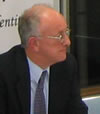 David
Walker is Professor of Australian Studies at Deakin University
in Melbourne. He has held the Monash Chair of Australian Studies at Georgetown
University and is a Fellow of the Academy of Social Sciences of Australia.
He has lectured and published widely in the field of Australian social
and cultural history, with particular focus on the relation of Australia
and Asia. Among other works he is the author of Anxious
Nation: Australia and the Rise of Asia, 1850-1939 (University
of Queensland Press, 1999), and editor of The
Oxford Book of Australian Travel Writing (with Ros Pesman and
Richard White, Oxford University Press, 1996) and Legacies
of White Australia: Race, Culture and Nation (with Laksiri Jayasuriya
and Jan Gothard, University of Western Australia Press, 2003). To download
a guide to finding Professor Walker’s work in libraries in Japan
click here.
David
Walker is Professor of Australian Studies at Deakin University
in Melbourne. He has held the Monash Chair of Australian Studies at Georgetown
University and is a Fellow of the Academy of Social Sciences of Australia.
He has lectured and published widely in the field of Australian social
and cultural history, with particular focus on the relation of Australia
and Asia. Among other works he is the author of Anxious
Nation: Australia and the Rise of Asia, 1850-1939 (University
of Queensland Press, 1999), and editor of The
Oxford Book of Australian Travel Writing (with Ros Pesman and
Richard White, Oxford University Press, 1996) and Legacies
of White Australia: Race, Culture and Nation (with Laksiri Jayasuriya
and Jan Gothard, University of Western Australia Press, 2003). To download
a guide to finding Professor Walker’s work in libraries in Japan
click here.
David Walker, Australia in Asia: Race, Region, and Identity, Policy Studies Forum, Tuesday December 14, 6:10 ~
Organized by David
Ewick and Modjtaba
Sadria
under the auspices of the University Graduate School
and Faculty of Policy Studies, Chuo University, Tokyo.
*
We are grateful for the able assistance of
Go Murakami and Hayato Yamauchi.
*
Page design by David Ewick.
Related links
Home
Chuo University
Japanese | English
Faculty of Policy Studies
Japanese | English
Policy Studies Forum:
Cultural Interaction in East Asia
Cultural Studies Open Seminar:
Cultural Change
Notes for Participants
Akira Iriye



Akitoshi Miyashita

Hiroshi Yoshioka



Yuzo Itagaki



John Clammer



Tin Tin Htun

Sujaya Dhanvantari

Anne Waldman



Chizuko Ueno



David Walker


